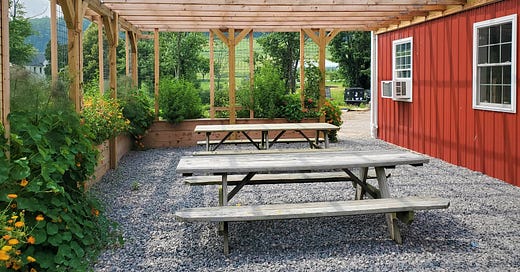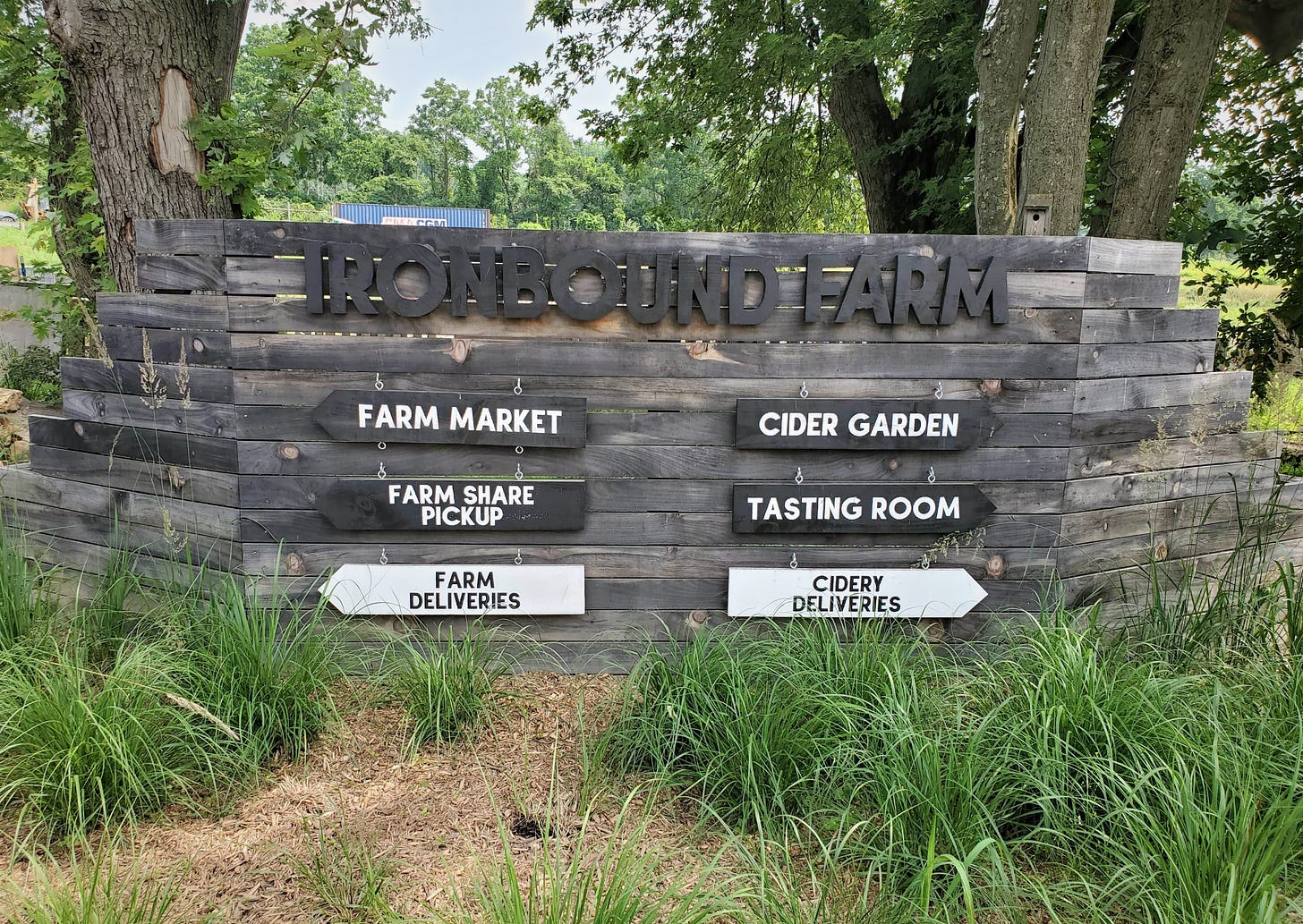Whenever we visit my parents in central New Jersey, I look for a place for us to go out and relax. I wanted to check out a microbrewery in High Bridge, but the first time I looked it up, a car had gone through its front window and shut it down, and the most recent time I looked it up, it had gone out of business.
There are only so many “interesting” places to go in the area that serve as both consumption and recreation—wineries, breweries, inns, farm stores, that kind of thing—and many of them are good enough for one visit and maybe not a second one. Even when they’re good, I’m curious about others. I guess the variety and the possibility of finding a hidden gem is part of the fun.
This time, up northeast of Clinton, out in farm country, I found a cider brewery. It’s not a new place, but I’d never found it before, and it had excellent reviews and looked interesting. We went one mid-afternoon back in July for hard cider and some light food.
It’s a big place. The parking situation was a bit confusing, and this sign with multiple paths greets you:
Farm market afterwards, we decided. The place had a healthy crowd and lots of indoor and outdoor seating. It was rustic and elegant, and homey. Hunterdon County isn’t a crowded place; it’s easy to wonder “Where are all these people coming from?” But if they’re coming from another county or state, isn’t that cool? It’s too easy to take your surroundings for granted.
The cider was very good. I’ve had cider that tasted like syrup, and cider that was too fizzy and dry for my tastes. This stuff was just right. Refreshing, light, slightly sweet, not too heavy on the alcohol. And it had a depth that suggested something finely and carefully made. Those were the regular varieties; they have a series of stronger and more interesting ciders we didn’t get to, which I’d like to go back and try.
The food was fancy and pricey, but also based on farm ingredients and very well put together. Here’s a marrow bone and stuffed, deep-fried zucchini blossoms!
I wrote the other week about little local places that are loved or hyped and that, to my tastes, turn out to be pretty mediocre. Somebody suggested that perhaps I was being a bit of a snob.
I don’t think so. I actually shy away from fine dining and fussy, expensive, boutique fare. Yes, I’ll enjoy a Michelin restaurant. But I’ll also enjoy a good all-you-can-eat buffet or roadside diner. A lot of places that sell their localism seem to just not execute the actual product that well.
These small, artisan places put a ton of effort and care into what they do, but many of them are still on the learning curve. I’m thinking of the many very average craft beers I’ve tried—even some with pronounced “off” flavors—or some of the U.S.-based artisan charcuterie companies. Maybe the whole product category is elitist. But being disappointed that a greatly upcharged product is inferior to something you can buy in the supermarket isn’t elitist.
This cider farm initially did raise some of my skepticism of places overselling their atmosphere or story and overpricing their fare. But all of us thought it was done very well. No feeling of being ripped off or wasting your time. Despite the prices, we might go back for a longer afternoon or for dinner. Maybe even for one of their events.
This is a real farm; between the cider barn and the farm store you pass a genuine landscape of working countryside.
At the farm store, we bought some vibrant-looking rainbow chard, skipped some very pricey ice cream, and tried a locally made jarred relish. This is just the produce fridge; there’s an indoor store to the left. The chard was delicious; supermarket vegetables really do lack flavor in comparison.
The view from another bit of outdoor seating was just lovely. I love cities and towns and places full of people and things to do. But one reason to support density is so that we can retain places like this within reasonable distance of major population centers.
I could stay here awhile.
In addition to the quality and the atmosphere, there is another element here: history. The farm is named Ironbound, after a neighborhood in Newark. And the flagship product is called Newark cider—an old style once, it’s said, praised by George Washington.
From an article in the New York Times:
Newark cider was both a point of pride and big business for the region — requested by name, reportedly lauded by George Washington and produced by dozens of Newark-area cideries with acres of orchards. The secret wasn’t a recipe, but the blending of a quartet of superior apples born in the region: Campfield, Poveshon, Granniwinkle and Harrison, the most celebrated of the four.
As a result of urbanization and then Prohibition, when many of the nation’s remaining cider orchards were destroyed, Newark cider hasn’t been made for at least a century. But after years of planning and planting — not to mention the accidental discovery of two lost apple trees and the investment of what Mr. Rosen called “100 percent of all the money I ever had in my entire life” — Ironbound Hard Cider is on the precipice of bringing it back.
And this bit:
The 1- and 2-year-old apple trees in Ironbound Hard Cider’s nursery include the Harrisons shown here and Poveshons, a New Jersey-born variety thought to be extinct until 2015.
Something almost truly lost. Recovering these things—stewarding the continuity of human endeavor—is a very deep thing. To some, probably, it’s still just overpriced food and drink. Is the story really worth the price? To me, it is. But at any rate, it’s something to do. And a little more than that.
Related Reading:
The Curious Phenomenon of the Garden Superstore
Not-Pennsylvania Amish Country
Thank you for reading! Please consider upgrading to a paid subscription to help support this newsletter. You’ll get a weekly subscribers-only post, plus full access to the archive: over 700 posts and growing. And you’ll help ensure more material like this!
















Lovely article, pictured included. Thanks.